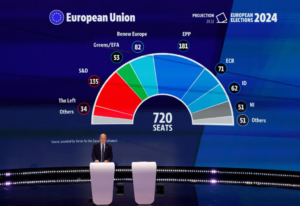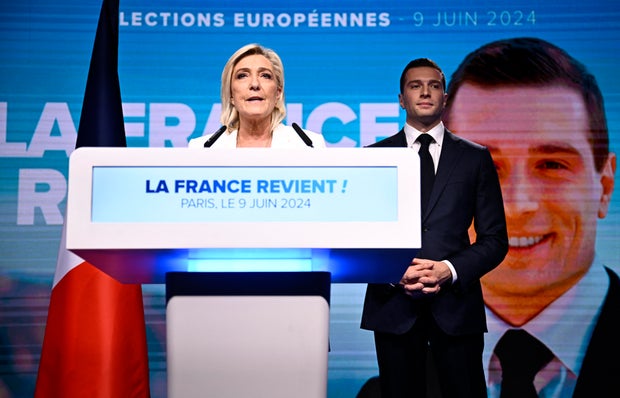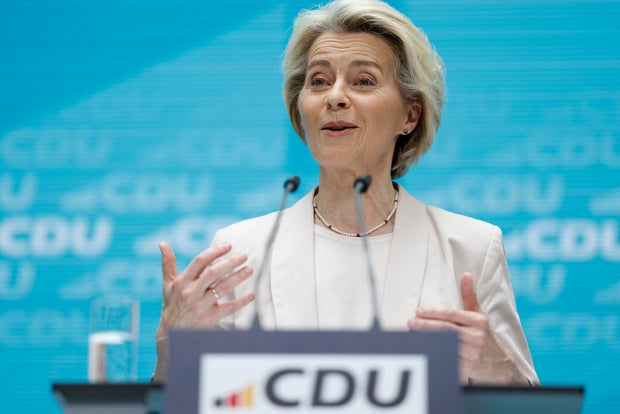
After four days of voting, with more than 400 million people eligible across 27 countries, European voters have pulled the bloc’s 720-seat parliament farther to the right than it has ever been. The European Parliament, for the next five years, will now have a record number of far-right legislators. Far-right parties made gains in Europe’s top three economies — Germany, France and Italy — with gains by politicians who campaigned against immigration, against support for Ukraine and against climate policy.
France
For France, the far-right National Rally party won the most votes to represent the republic in the European Parliament, more than 31% of all French votes cast — more than double the nearly 14% of votes for centrist candidates supported by French President Emmanuel Macron.
Macron dissolved France’s Parliament almost immediately and called for shock, snap elections. The first round of voting is set for June 30, with the second round scheduled for July 7.
“I give back to you the choice for the future of our Parliament,” a somber-faced Macron said in a national broadcast. “The rise of nationalists, of demagogues, is a danger for our nation, but also for our Europe, for France’s place in Europe and in the world.”
His surprise political gamble may be intended to shock French voters from shifting further to the right, but if he loses more power, that raises the chance Marine Le Pen’s National Rally will gain, with talk of its telegenic 28-year old party president Jordan Bardella becoming premier and Le Pen possibly ascending to the presidency after Macron in 2027.
JULIEN DE ROSA/AFP via Getty Images
Italy
For Italy, the party of Prime Minister Giorgia Meloni — the Brothers of Italy, with its neo-fascist roots — also won the most votes. Its nearly 29% haul of Italy’s votes for the European Parliament more than quadrupled its vote share compared to five years ago. Italy’s opposition center-left Democratic Party came in second with 24% of the vote.
“Italians are giving us a loud and clear message to go ahead with our work,” said Meloni on Italian radio.
The premier, however, has recently moderated her international image, dropped anti-EU rhetoric and portrayed herself as a bridge between her own arch-conservatives and Europe’s moderate center-right. Her party’s strong showing in European Parliament elections could now increase Italy’s power in deciding who it will support as next president of the European Commission, currently held by the center-right Ursula von der Leyen. Meloni says she has not decided whether it would be von der Leyen again.
Germany
For Germany, the extreme-right Alternative for Germany party finished in second place, with nearly 16% of the vote — despite a series of self-inflicted scandals linked to Nazi propaganda, Chinese espionage and Russian bribery among its leaders and members. German Chancellor Olaf Scholz’s party, the Social Democrats, which has been a pillar of German politics across more than five decades, came in with less than 14%, making for the worst result in a national referendum in more than 100 years and calling into question whether his coalition government can survive.
Slovakia
But not all nationalist parties prevailed. Bucking opinion polls, Slovakia’s prime minister, Robert Fico, is now confronting a surprise defeat after his left-wing nationalist Smer-SD party came in second with nearly 25% of the vote to the liberal, pro-Western Progressive Slovakia party, which won nearly 28% of the vote. One of Smer’s main political platforms has been its refusal to send weapons to Ukraine in its war against Russia.
Fico narrowly survived an assassination attempt after being shot at four times by a gunman on May 15. Opinion polls had found his party was favored to win, implying that the premier’s near-death may had driven support and a solidarity vote.
Europe’s center holds — for now
To be sure, seat gains by far-right parties in the European Parliament are not massive in terms of absolute numbers — two seats here, five seats there in a 720- seat parliament — but they are remarkable because it illustrates the creep of acceptance of once-fringe right wing policies into what was once a traditionally liberal European mindset as Europe’s centrist parties tried to stay relevant and hold onto power. And it could serve as a roadmap for Europe’s right wing to keep on winning future elections and perhaps ultimately gain the levers of power to control governance of Europe.
But as far-right candidates celebrated, so did European Commission President Ursula von der Leyden. Her center-right European People’s Party, in fact, gained seats to keep its hold as the biggest block in the European Parliament.
ODD ANDERSEN/AFP via Getty Images
“The center is holding but it is also true that the extremes on the left and on the right have gained support,” von der Leyen said in Brussels, home of the European Union.
For her to win a second five-year term, she needs the support of a majority of the EU’s national leaders and a working majority in the European Parliament. She has begun working on forming a grand coalition to govern.
“We may differ on individual points,” she said, calling out centrist members of parliament, “but we all have an interest in stability and we all want a strong and effective Europe.”


